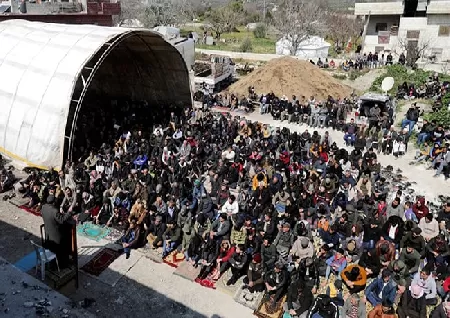Turkey Begins To Rebuild Homes For 1.5 Million peoples Left Homeless By Quake

After this month's deadly earthquakes, Turkey has started the process of rebuilding houses, a government official announced on Friday as the death toll in both Turkey and Syria crossed the 50,000 mark. The earthquakes on February 6 that killed tens of thousands in Turkey and neighbouring Syria also caused more than 160,000 structures, holding 520,000 apartments, to collapse or suffer significant damage. The Disaster and Emergency Management Authority (AFAD) reported on Friday night that there had been an increase in the number of earthquake-related fatalities in Turkey to 44,218. With Syria's most recent death toll of 5,914, the total number of deaths in the two nations has surpassed 50,000. President Tayyip Erdogan has promised to reconstruct homes within a year despite the fact that authorities should prioritise safety above expediency given that he faces an election in a few months. The most recent earthquakes caused several structures that were designed to resist shocks to collapse." For several projects, bids and contracts have been made. The official, who spoke on the condition of anonymity, stated that the procedure was proceeding quickly and that safety would not be compromised. Officials claim that tents have been sent out for the numerous homeless, but individuals have complained that getting to them is difficult. There are eight of my kids. We are now camped out. The ground is wet, and there is water on top of the tent. The 67-year-old Melek, who was in line to receive relief outside a high school in the town of Hassa, said that "we are begging for more tents, and they don't provide them to us."An organisation known as Interrail Turkey, a group of volunteers, was using the school as a distribution point for aid. According to one volunteer, Sumeyye Karabocek, the largest issue is still a lack of tents.
Half a million people need for new homes
Erdogan's administration has come under fire for both how it handled the destruction and for what many Turks claim were years of lax enforcement of building quality standards. According to him, the Turkish government's initial plan is for the construction of 70,000 village homes and 200,000 flats at a cost of at least $15 billion. Rebuilding houses and infrastructure, according to JPMorgan Bank, would cost $25 billion. According to the UNDP, 500,000 additional dwellings are required to house the 1.5 million people who are now homeless as a result of the catastrophe.From the $1 billion in cash requested by the UN last week, it claimed to have asked for $113.5 million, adding that it would use the money to clear mountains of rubble. 116 million to 210 million tonnes of rubble were created by the catastrophe, according to the UNDP, compared to 13 million tonnes following the 1999 earthquake in northwest Turkey. In accordance with new rules released by Turkey, businesses and nonprofit organisations are now permitted to construct residences and commercial buildings for the benefit of those in need. Many survivors have either fled the earthquake-affected area in southern Turkey or have relocated to tent cities, container houses, or other government-funded housing. Saeed Sleiman Ertoglu, 56, stocked up in Antakya.little was left of his undamaged stock from his waterpipe store. When his house and business withstood the first earthquakes but not the second, he remarked, "The glassware was extremely beautiful, more than normal, but then we had this earthquake, and it all got damaged. He thought that about 5% of his goods had survived.
Related queries to this article
- Turkey
- Turkey Earthquake
- Turkey
- Syria
- The Disaster and Emergency Management Authority
- UNDP
- President
- Tayyip Erdogan
Read more articles and stories on InstaSity Latest News.





